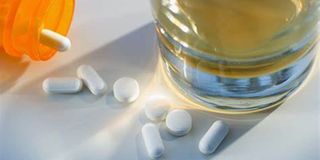Ask the doctor: HIV drugs and alcohol risk

Is it true that I should not drink alcohol while taking ARVs? Amos
Dear Amos,
Although reasonable alcohol consumption may not have adverse health effects on someone who does or does not have HIV infection, a person who is HIV positive should avoid taking alcohol, especially when they are taking ARVs. Also, people living with HIV and other conditions including hypertension, high levels of cholesterol in the blood, liver diseases such as hepatitis and diabetes, should avoid alcoholic drinks.
Avoiding alcohol is especially important if someone who is HIV positive also suffers from the above mentioned conditions and is taking medication to treat them. This is because HIV drugs (ARVs) are likely to have bad interactions with these drugs, leading to bad treatment outcomes.
People always say they are drinking alcohol moderately only to fail regulating themselves leading to alcoholism with attendant problems to their health regardless of whether they are living with HIV or not. Therefore, if one does not drink, then they should not start drinking with the aim of doing it moderately because they are likely to drink more.
Although alcohol may not interfere with the way the antiviral drugs work, frequent or heavy alcohol use over time may increase the decline of CD4+ cell count (cells that protect against infection including HIV), hence worsening HIV infection and opportunistic infections. Drinking alcohol may also make one forget their treatment routine, leading to ARVs resistance, making the drugs less effective.
A healthy liver is important for the body to process some antiretroviral medicines effectively. The rise in blood fat caused by some anti-HIV drugs can be worsened by heavy drinking. High blood fat can lead to heart disease and stroke. Also, a person on treatment for tuberculosis (TB), which is common in people living with HIV, is likely to suffer lots of side effects if they drink alcohol.
Common reasons for STD recurrence
I have had a persistent sexually transmitted disease (STD) that is not responding to medication. What should I do? Santos
Dear Santos,
There are different STDs, including those caused by bacteria (gonorrhoea, syphilis), viruses (hepatitis B, HIV), parasites (lice) and protozoa (trichomonas vaginalis).
When you mention recurrent STDs, then we consider those, including the above, that may have resisted treatment or failed to be cured due among other reasons wrong or inadequate treatment or the treatment was good and adequate but the germs were resistant.
There are STDs, including HIV, herpes, HPV and Hepatitis B, that cannot be cured even if correct drugs in correct doses have been given.
Visit your doctor again so that more treatment and an explanation on your condition are given. Many people may fail to get cured because they do not visit their doctor again for a review and further treatment in case the initial treatment for one reason or another did not work.




